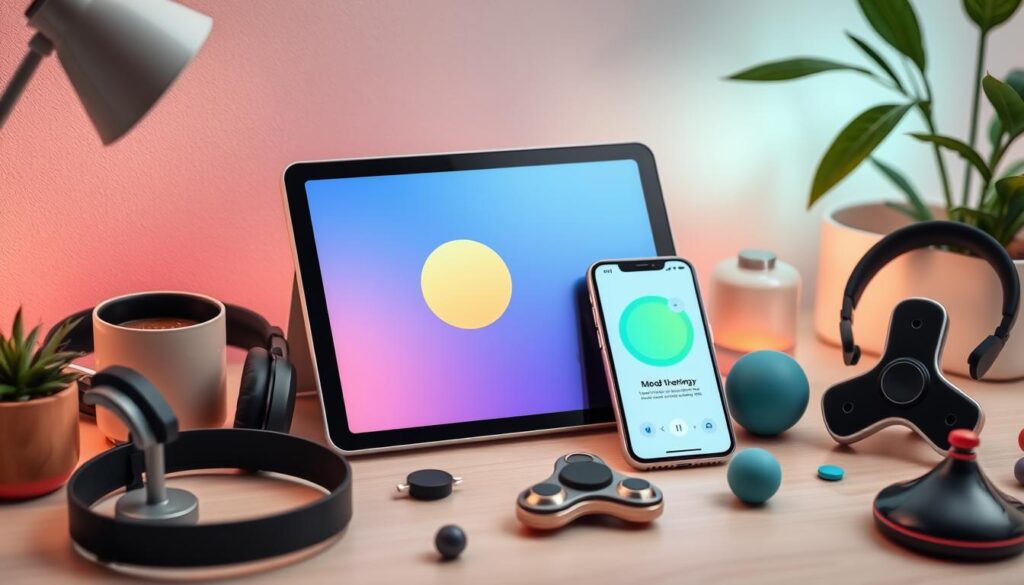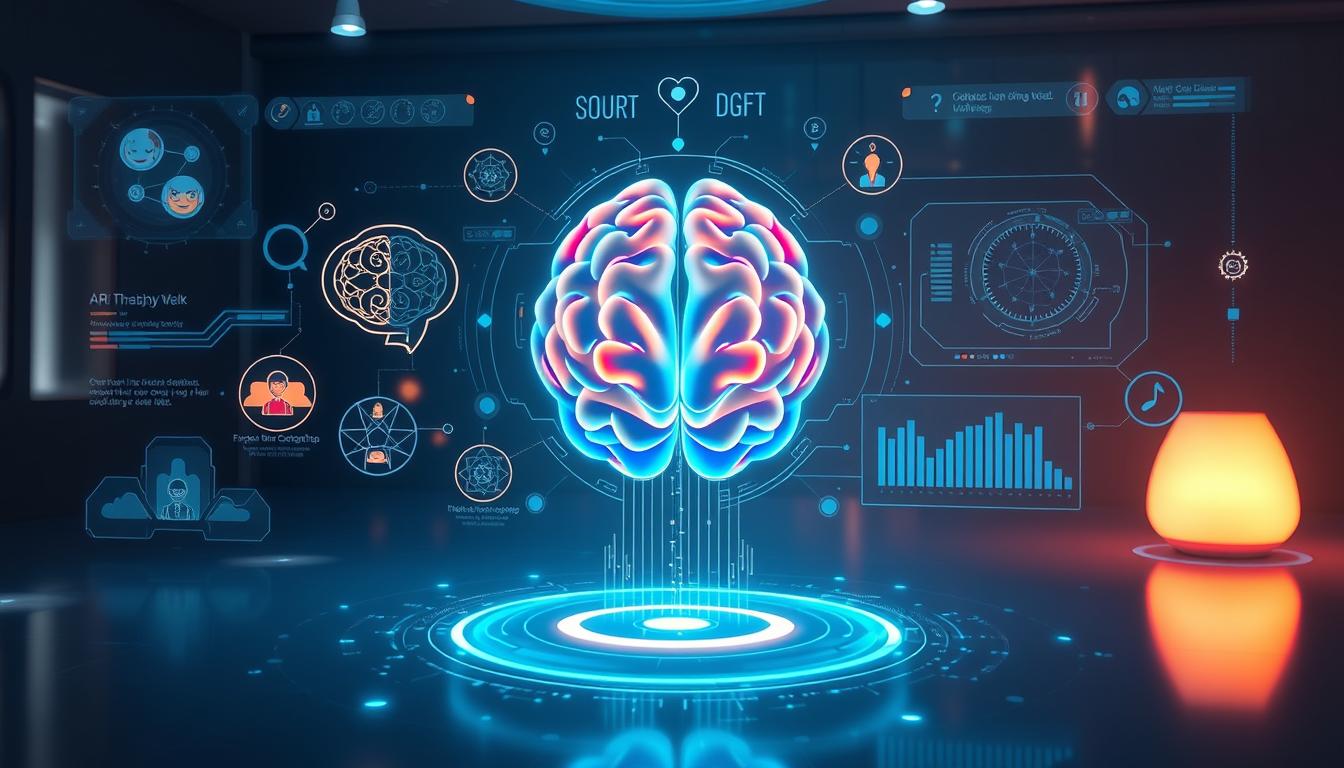Did you know that suicide is now the fourth leading cause of death among 15 to 29-year-olds worldwide? This is a shocking fact that shows we need new ways to help with mental health1. AI is changing how we treat mental health, making it easier and more personal for those who need help. As technology gets better, 77% of companies are making sure AI is used responsibly in this field2.
AI is helping us understand tough issues like depression and suicidal thoughts. It uses special algorithms to guess how well therapy will work, with 80% accuracy1. Also, AI has already shown it can make people’s mental health better, proving it’s a game-changer2.
When looking for better mental health care, don’t forget about digital tools like chatbots and virtual assistants. They provide quick help and connect people to more help. This look into AI’s role in mental health shows how tech can help us all feel better.
Key Takeaways
- AI is revolutionizing mental health services by enhancing treatment personalization and accessibility.
- 77% of organizations prioritize AI regulations to ensure responsible use in mental health.
- Machine learning achieves up to 80% accuracy in predicting responses to therapies like CBT.
- AI-driven solutions contribute to positive mental health outcomes.
- Digital therapy tools offer immediate support, bridging gaps in traditional mental health services.
The Role of AI in Mental Health Treatment
AI is changing how we get mental health help. It brings new tools like telepsychiatry and chatbots. These tools help you get support right away and do exercises that have been proven to work.
Understanding AI Mental Health Applications
Tools like Woebot and Wysa are always there for you. They offer help anytime, anywhere. This meets the growing need for mental health services3.
These digital helpers use smart tech to give you care that’s backed by science. They help lower feelings of sadness and worry, as studies and users have shown4.
Benefits of AI in Therapy
AI makes therapy more accessible and affordable. It helps people get the help they need without feeling judged. Plus, it learns about you over time to offer care that fits you best3.
Ethical Considerations in AI Therapy
AI in therapy has big benefits, but we must talk about its ethics. We need to make sure it’s fair and keeps your data safe. Fixing these issues will help more people trust and use these tools5.
Types of Digital Therapy Tools Available
In today’s world, many tools help with mental health. They offer new ways to meet different needs. From chatbots to mobile apps and online counseling, these tools make treatment better and easier to get.
Chatbots and Virtual Assistants
Chatbots for therapy are becoming more popular. They offer quick support and resources. These digital helpers talk to you, giving tips and emotional support anytime.
They make it easy to get help without seeing a doctor in person.
Mobile Apps for Self-Help
Many mental health apps help you help yourself. They track your mood, let you journal, and guide you in meditation. Apps like BioBase have even cut sick days by up to 31%6.
These tools help you manage your mental health and take control of your well-being.
Online Counseling Services
E-counseling has changed how we get therapy, especially since the pandemic. It’s now more popular because it’s convenient and comfortable. You can talk to licensed therapists online, getting quality support easily.
Technology in mental health is getting better, with accuracy rates from 63% to 92%6. This shows how technology is becoming a big part of treating mental health.

Personalized Mental Health Care Through AI
Artificial intelligence is changing mental health care by offering personalized plans. This change comes from data-driven insights that help professionals make tailored therapy plans. AI can look at lots of patient data to find the best treatments for depression and anxiety.Learn more about how AI enhances therapeutic.
Data-Driven Insights for Tailored Therapy
AI can analyze large datasets to make diagnoses more accurate and treatment plans more personal. The old mental health system can’t keep up with demand because there aren’t enough professionals. AI apps try to help by finding problems early and making treatment better.
AI tools quickly look at health conditions and find patterns. They give insights to help mental health experts make good plans for you7. AI also helps track how patients are doing and changes treatment as needed, making sure care fits your changing needs8.
Continuous Monitoring and Feedback
Keeping an eye on mental health is key for good therapy. AI tools give feedback on how patients are doing in real time. This lets therapists make changes as they go, making sure care is always on track.
AI in therapy means your mental health is always watched, even when therapists aren’t available. This makes therapy better and more available for everyone7.
Enhancing Accessibility to Mental Health Services
AI is changing mental health services for the better. It makes care more accessible, especially for those in remote areas. Now, over 10,000 mental health apps are available, offering support anytime, anywhere9.
These apps let users connect with resources easily, without worrying about travel or location. This is a big step forward in making mental health services more available.
Breaking Down Geographical Barriers
AI can look at lots of data to find new ways to help. This makes mental health services better and more accessible10. iOS and Android have also made these resources available to more people9.
Even with so many options, getting help is still hard for many. We need to keep working to make it easier for everyone to get the support they need.
Reducing Stigma Through Digital Platforms
Digital platforms help reduce stigma by offering a safe space for help-seeking. Since 1 in 4 people face mental health issues each year, it’s crucial to have a safe place to talk about it11. Mental health apps can help make talking about mental health normal.
Groups like SonderMind are also helping by offering free or low-cost mental health care. This makes it easier for those in need to get the help they deserve11.

The Science Behind AI-Driven Mental Health Solutions
AI has changed how we treat mental health, especially with machine learning. These tools help therapists create better plans for each patient. They look at lots of data to understand what each person needs.
Machine Learning Algorithms in Therapy
Machine learning helps us understand mental health better by looking at lots of data. The AI in mental health market is growing fast, at 39.1% from 2022 to 202712. It’s becoming key for therapists. For example, digital phenotyping uses phone data to spot mental health issues13.
Cognitive Behavioral Therapy (CBT) Enhancement
AI has made CBT better. It uses machine learning to make therapy plans fit each person. This makes therapy more effective for things like depression and anxiety12.

| Aspect | Traditional Methods | AI-Enhanced Methods |
|---|---|---|
| Data Analysis | Limited scope with manual assessments | Real-time data analysis from various sources |
| Personalization | Generic treatment plans | Tailored interventions based on individual data |
| Outcome Tracking | Periodic evaluations | Continuous monitoring with immediate feedback |
| Patient Engagement | Traditional in-person sessions | Interactive digital tools and wearables |
These changes show how technology is changing mental health care. As AI in therapy gets better, the future looks bright13.
Integrating AI with Traditional Therapy Approaches
Artificial intelligence and traditional therapy come together in a new way called hybrid care in mental health. This mix uses the best of digital tools and face-to-face talks. It makes mental health support stronger and more varied for everyone.
Hybrid Models of Care
Hybrid care in mental health lets therapists use AI to improve their work. AI tools help during sessions, making therapy better. They give insights that help therapists tailor care to each patient’s needs.
Complementing Face-to-Face Sessions
AI in therapy makes sessions more effective. For example, AI chatbots can check how patients feel before meetings. This lets therapists plan better. It’s a mix of old and new therapy that works well together.
This new approach puts a big focus on using technology to help patients. AI helps analyze data and make treatments more personal. It’s changing how we think about therapy. You can learn more about AI in mental health here2.

The Future of Mental Health Technology
Mental health technology is changing fast. New AI tools will change how we get help for our minds. Soon, therapy and treatment might look very different.
Innovations on the Horizon
Virtual reality therapy could make therapy feel real. AI might also help find mental health issues better. There are thousands of mental health apps out there, but we need to know if they work well14.
AI is helping in many ways, like sensing our feelings and talking to us through chatbots. Scientists are working hard to make these apps help with mental health problems. For example, Dr. Patricia Areán’s study used a smartphone app to help people14.
Future Challenges and Considerations
Even with new tech, we face big challenges. Mental health issues have gone up by 48% worldwide in 20 years15. The cost of mental health care is expected to rise a lot, making access a big problem15.
Money and who you are can affect if you get help. People from lower income families and some groups, like Black people, often can’t get the care they need15. We must work to make sure everyone can get the help they deserve.
| Type of App | Primary Function | Target Audience |
|---|---|---|
| Symptom Tracking Apps | Real-time mental state analysis using phone sensors | Individuals monitoring their mental health |
| Cognitive Remediation Apps | Improving thinking skills for serious mental illnesses | Users with diagnosed mental health conditions |
| Skill Training Apps | Teaching coping or thinking skills | General audience seeking self-help |
| Illness Management Apps | Connecting users with peer support or healthcare providers | Individuals managing chronic mental health issues |
| Self-Management Apps | Allowing users to input information for feedback | Individuals seeking to take charge of their mental health |
We must keep moving forward with these new technologies. But we also need to tackle the mental health challenges they bring1415.
User Experience in Mental Health Apps
User experience in mental health apps is key to keeping users engaged. A good design makes it easy to use the app’s features. This leads to more consistent use.
Studies show that a high Mobile App Rating Scale (MARS) score means more app revenue and user activity. This shows how important a good user experience is for these digital tools.
Importance of Design and Usability
Mental health apps should focus on what users need. A design that looks good and works well encourages users to keep using it. Research shows that design matters a lot for keeping users interested in the long run.
Improving based on user feedback can make users happier and more likely to stick with the app. This is key for the app to really help people.
Gathering User Feedback for Improvement
Getting feedback from users is crucial for making mental health apps better. Many people with mental health issues don’t get the help they need. This makes digital tools even more important.
Using user feedback helps developers make the app better. This means the app can grow and improve, helping more people with their mental health.

| Aspect | Correlation Strength | Significance Level |
|---|---|---|
| MARS Total Score & Revenue | Moderately Positive | P=.002 |
| MARS Total Score & MAU | Moderately Positive | P </.001> |
| MARS Total Score & Downloads | Moderately Positive | P </.001> |
| MARS Total Score & App Store Rating | Weak | P=.20 |
By focusing on user experience, developers can make mental health apps that really help. Good design and listening to users lead to more engagement and better mental health management16.
Case Studies: Success Stories of AI in Mental Health
Technology is changing mental health services a lot. Many case studies show how AI helps. They show big improvements and new ways to care for people.
AI platforms make support easier to get. They show how digital therapy works in real life.
Real-World Applications of Digital Therapy
Woebot has helped almost 1.5 million people with mental health issues. This is especially true in places with few mental health providers17. It has helped with anxiety and depression, showing AI can be very helpful.
In 2021, over five billion dollars was invested in digital mental health startups. This shows a lot of people believe in AI for mental health17.
Positive Outcomes from AI Interventions
AI helps with many mental health problems, like anxiety and PTSD18. With more people online, AI can help even more people with their mental health18. It makes getting help easier and works well with traditional therapy.
Measuring the Effectiveness of AI Mental Health Tools
In the fast-growing field of mental health, it’s key to check how well AI tools work. We use important metrics to see how these tools help users feel better and function better. Research shows AI is helping make mental health care more accessible to everyone.
Key Metrics and Evaluation Techniques
To see if AI mental health tools are working, we use different ways to measure:
- User Feedback: We listen to what users say right away to see how they’re feeling.
- Symptom Reduction: We look at how much AI helps lower anxiety and depression symptoms.
- Adherence Rates: We track how often users use AI tools and stick to their plans.
- Establishment of Therapeutic Alliance: We measure how well users connect and trust AI tools, which makes treatment better.
Research and Studies Supporting AI Efficacy
Studies show AI is making a big difference in mental health. For example, chatbots like Woebot and Wysa have helped lower depression and anxiety symptoms. They’ve also built trust with users, which is key for effective treatment19.
AI is also helping match people with the right treatments, especially for those who are often left out20. In the U.K., the NHS uses AI to handle 400,000 mental health cases every year. This shows AI is really helping20.
But, there are still challenges in using these digital tools in everyday care. Still, research keeps going to make AI mental health tools even better at helping people.
Privacy and Security in Mental Health Technology
In mental health tech, keeping user data safe is key to building trust. A growing focus on data privacy in mental health shows the need for AI security. Mental health apps have grown by 54.6% from 2019 to 2021, making data protection even more critical21.
Protecting User Data with AI Tools
AI tools need strong security to prevent data breaches. Mental health apps’ rise brings new challenges. It’s vital to improve data privacy in mental health, especially with the FTC’s actions against some platforms21.
Also, following health regulations is essential to protect users from data misuse. Studies show 22 out of 32 mental health apps lack privacy protections. This calls for strict regulatory standards21.
Regulations Governing Digital Health Services
AI in mental health needs strict adherence to rules like HIPAA. This ensures patient data stays private and secure. Without national data privacy laws, sensitive info is at risk, making clear policies crucial22.
There’s a need for stronger laws to match the privacy standards of traditional healthcare. AI’s growing role in mental health raises ethical concerns about data misuse22.
How to Choose the Right AI Mental Health Tool for You
Finding the right AI mental health tool is key to your mental health. Start by figuring out what you need and what you like. With over 264 million people worldwide dealing with depression, finding a tool that fits you is crucial23. Think about what mental health issues you face and what kind of help you need.
Assessing Your Needs and Preferences
It’s important to know what makes you unique when picking AI mental health tools. Look for tools that offer personalized support, like adjusting based on how you use them and your emotions24. Knowing what therapy methods you prefer, like cognitive-behavioral therapy or mindfulness, helps narrow down your choices.
Features to Look for in Digital Therapy Solutions
Check out the digital therapy features that matter, like how easy it is to use and if it’s accessible25. A simple interface makes it easier to manage your mental health25. Also, look for tools with immediate support, like chatbots or virtual therapists, for quick help23. Make sure the platform values your privacy and keeps your information safe.
FAQ
What is AI’s role in mental health services?
How do digital therapy tools improve mental health?
What are the ethical concerns associated with AI in mental health?
How can AI personalize mental health care?
Can AI improve accessibility to mental health services?
What technologies are being used in AI-driven mental health treatment?
How do I choose the right AI mental health tool for my needs?
What are the privacy measures in place for AI mental health solutions?
How is the effectiveness of AI mental health tools measured?
Source Links
- AI In Mental Health: Opportunities And Challenges In Developing Intelligent Digital Therapies – https://www.forbes.com/sites/bernardmarr/2023/07/06/ai-in-mental-health-opportunities-and-challenges-in-developing-intelligent-digital-therapies/
- Artificial intelligence in positive mental health: a narrative review – https://pmc.ncbi.nlm.nih.gov/articles/PMC10982476/
- Exploring the Role of AI in Revolutionizing Mental Health Support – https://www.drannetteermshar.com/exploring-the-role-of-ai-in-revolutionizing-mental-health-support/
- Smart Therapy Solutions: The Rise of AI in Mental Health Care – https://trendsresearch.org/insight/smart-therapy-solutions-the-rise-of-ai-in-mental-health-care/?srsltid=AfmBOorTx_7FBZexSNWc-D9sTZ5WxklBGtgG2tHzlmFIRuNOvnCvi8ju
- Technology and mental health: The role of artificial intelligence | European Psychiatry | Cambridge Core – https://www.cambridge.org/core/journals/european-psychiatry/article/technology-and-mental-health-the-role-of-artificial-intelligence/7056DC68CF2F384756708C8F06AC6C9D
- AI in Mental Health – Examples, Benefits & Trends — ITRex – https://itrexgroup.com/blog/ai-mental-health-examples-trends/
- Contributed: The future of mental health apps: revolutionizing healthcare with AI – https://www.mobihealthnews.com/news/contributed-future-mental-health-apps-revolutionizing-healthcare-ai
- Artificial Intelligence for Mental Health and Mental Illnesses: An Overview – https://pmc.ncbi.nlm.nih.gov/articles/PMC7274446/
- Accessibility and Digital Mental Health: Considerations for More Accessible and Equitable Mental Health Apps – https://pmc.ncbi.nlm.nih.gov/articles/PMC8521906/
- Artificial Intelligence in Mental Health Care: Management Implications, Ethical Challenges, and Policy Considerations – https://www.mdpi.com/2076-3387/14/9/227
- Technology and Mental Health | Innovations in Wellness – https://userway.org/blog/technology-and-mental-health/
- The Impact of AI in Mental Health – https://appinventiv.com/blog/ai-in-mental-health/
- The Data-Driven Future of Mental Health Treatment – https://www.theatlantic.com/sponsored/google-2023/the-data-driven-future-of-mental-health-treatment/3883/
- Technology and the Future of Mental Health Treatment – https://www.nimh.nih.gov/health/topics/technology-and-the-future-of-mental-health-treatment
- Is AI the Future of Mental Healthcare? – https://pmc.ncbi.nlm.nih.gov/articles/PMC10230127/
- User Experience, Engagement, and Popularity in Mental Health Apps: Secondary Analysis of App Analytics and Expert App Reviews – https://humanfactors.jmir.org/2022/1/e30766
- Can A.I. Treat Mental Illness? – https://www.newyorker.com/magazine/2023/03/06/can-ai-treat-mental-illness
- Mental Health for All: The Case for Investing in Digital Mental Health to Improve Global Outcomes, Access, and Innovation in Low-Resource Settings – https://pmc.ncbi.nlm.nih.gov/articles/PMC10649112/
- Smart Therapy Solutions: The Rise of AI in Mental Health Care – https://trendsresearch.org/insight/smart-therapy-solutions-the-rise-of-ai-in-mental-health-care/?srsltid=AfmBOoqKq4nMQG30RumPPkXRt2o7FKKAqBaHk0OQcEyrJ5y0zLP0TVHI
- AI Chatbots Break Down Barriers to Much-Needed Mental Health Treatments – https://www.rgare.com/knowledge-center/article/ai-chatbots-break-down-barriers-to-much-needed-mental-health-treatments
- Why mental health apps need to take privacy more seriously – https://www.brookings.edu/articles/why-mental-health-apps-need-to-take-privacy-more-seriously/
- The unseen dilemma of AI in mental healthcare – AI & SOCIETY – https://link.springer.com/article/10.1007/s00146-024-01937-9
- Best AI Tools for Mental Health Support (2024) – https://buddyxtheme.com/best-ai-tools-for-mental-health-support/
- Review of Best 8 Free Online Therapy Apps: Finding the Right Fit for You – https://sintelly.com/articles/review-of-free-online-therapy-apps-ai/
- AI therapy & Opportunities for Therapists in AI to Make Therapy Better – https://www.mentalyc.com/blog/ai-mental-health-cbt-therapy



